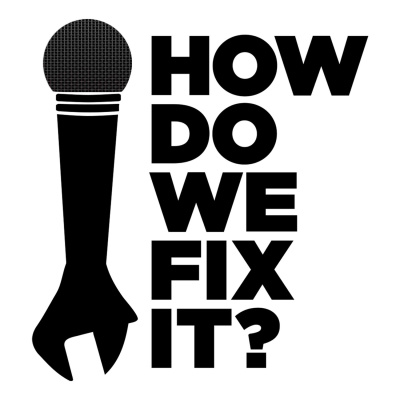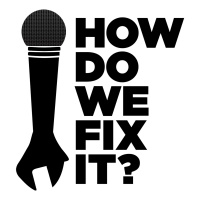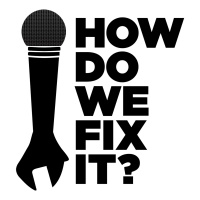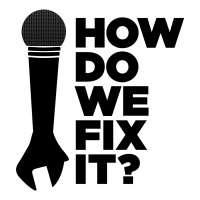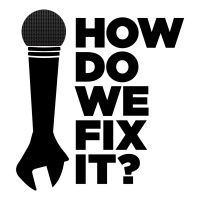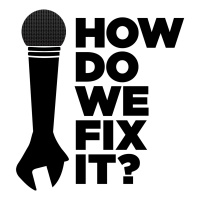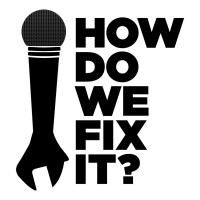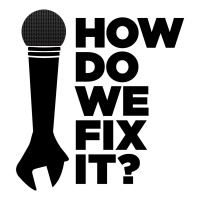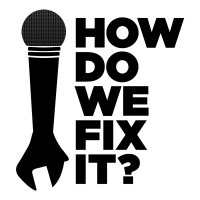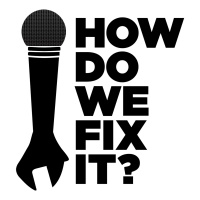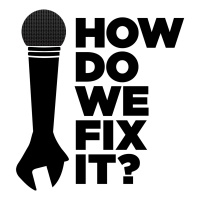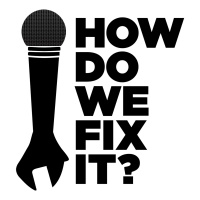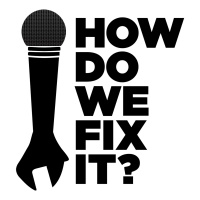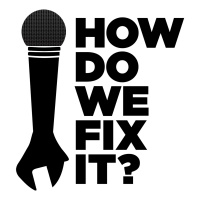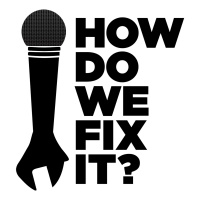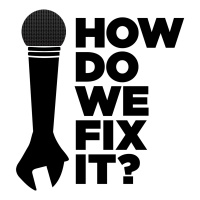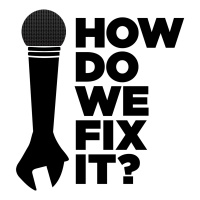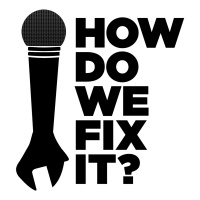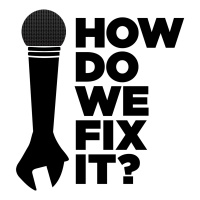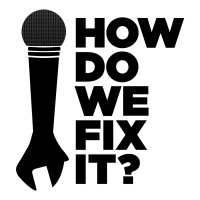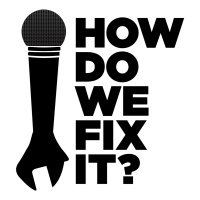Synopsis
From politics to the personal, we're about solutions. Our weekly podcast features two friends and longtime journalists. Join Richard Davies (ABC News) and Jim Meigs (Popular Mechanics) as they challenge authors, experts and provocateurs in a search for positive, practical ideas. Guests include Alan Dershowitz, a noted legal scholar and defender of civil liberties; Mike Rowe of "Dirty Jobs" and Lenore Skenazy, founder of "Free Range Kids." Topics include politics, parenting, personal finance, human behavior and much more. "How Do We Fix It?" - a repair manual for the real world. Produced by DaviesContent
Episodes
-
Our Towns. Solutions & Reinvention: James Fallows
07/06/2018 Duration: 24minCongress sank to a dismal 10% approval rating in a new poll. Most Americans believe the nation is heading in the wrong direction. But ask people about their own lives and local communities, and you are likely to get a very different answer.According to a Gallup poll, well over 80% of Americans are satisfied in general with the way their personal lives are going.Despite negative media coverage of "fly-over country" and the "rust belt", exciting things are happening in towns and cities across the country."This still can be the country people would like to think it is," says well-known journalist James Fallows of The Atlantic magazine and co-author of "Our Towns: A 100,000-Mile Journey Into the Heart of America." He says that most people don't realize how fast the country is moving toward becoming a better version of itself.The book and our interview offer a surprising portrait of the civic and economic reinvention taking place. James and his wife Deborah Fallows wrote the
-
The Next Debt Crisis: Maya MacGuineas
31/05/2018 Duration: 25min"The debt will be as large as our entire economy by the end of the decade", says Maya MacGuineas, President of the bipartisan Committee for a Responsible Federal Budget. "Every indicator that you could look for in terms of the numbers is on flashing red alert."The U.S. federal government debt is nearly $20 trillion and rising each year. Interest payments are the single fastest growing part of the federal budget, and higher interest rates in the near future will add to the enormous burden.A recent report from the International Monetary Fund predicts that the U.S. will be the only advanced economy in the world to see its debt burden grow significantly over the next five years.As seen recently with Italy's debt, a full-blown bond crisis can erupt at any time. But President Trump and both parties in Congress are barely focusing on the problem. Media coverage is usually confined to the business press.This episode looks at why the 2018 Tax Cuts and Jobs Act expands projected annual def
-
The Great Environmental Debate: Charles C. Mann
24/05/2018 Duration: 32minFar too often, politics and policy are portrayed as a battle between liberals and conservatives, or socialists vs. capitalists. But one of the most profound divides of modern times is between optimists and pessimists-- especially over how they view the environment.This episode looks at the debate between environmental optimists (wizards), who believe we can invent our way to a better, healthier future, and pessimists (prophets), who say we must impose limits on pollution, over-crowding other impacts of humans on the planet.Our guest, journalist, Charles C. Mann, author of new book, "The Wizard and The Prophet", is a correspondent for The Atlantic, Science and Wired. Two of his previous books, 1491 and 1493, were widely-acclaimed best sellers.We consider the dueling visions of two remarkable scientists. Norman Borlaug's research led to the Green Revolution, which saved hundreds of millions of lives, and boosted agricultural production. He was awarded the Nobel Peace Prize for his work. William Vogt, who s
-
Fighting Gang Violence: Jonathan Green
17/05/2018 Duration: 27minFrom the streets of Chicago and Los Angeles, to indictments this month targeting criminal networks in Savannah, Georgia and white supremacists in Grand Prairie, Texas, tens of thousands of gangs are responsible for drug crimes, brutal killings and other forms of violence. According to one recent estimate, nearly one-and-a-half million people are members of gangs in the United States.In this episode, we look at the lessons learned from the successful police and federal crackdown against Sex Money Murder (SMM), New York City's most violent drug gang in the early 1990's. The Bronx had one the highest murder rates in the country. The notorious SMM was the most violent gang in the city.Our guest, Jonathan Green, is the author of the new book, "Sex Money Murder: A Story of Crack, Blood and Betrayal." He tells the hair-raising story of how SMM brutally dealt with rivals and anyone else who got in their way, as well as the economics of the crack epidemic, which brough
-
A Solution for Israelis & Palestinians? Dahlia Scheindlin
10/05/2018 Duration: 34minPresident Trump's rejection of the Iran nuclear agreement and Israeli military attacks on Iranian sites in Syria are among the latest signs of rising tensions in the Middle East. The threat of war is ever-present.Twenty five years after the signing of the Oslo Accords, relations between the Israeli government and Palestinian Authority are at a low point. There has been no significant peace process in many years.We speak with Israeli public opinion analyst, strategic consultant and peace researcher, Dahlia Scheindlin, who is hopeful that a new peace agreement will emerge. In addition to her work with Israelis and Palestinian, she has expertise conflict resolution in Eastern Europe and the Balkans. Dahlia is co-host of the podcast, The Tel Aviv Review.In this episode, we discuss the proposal for a confederation between Israel and Palestine. Unlike the hard borders in a traditional two-state solution, a two-state confederation would allow for greater movement of
-
Stopping Sexual Harassment
03/05/2018 Duration: 20minThe growing #MeToo movement has exposed many cases of sexual harassment and retaliation in the workplace.Among the latest examples is an upheaval at Nike. Female employees, fed up with years of gender discrimination, insensitive behavior and crude comments by male colleagues, took action. Covertly, they surveyed female peers, asking about their experiences. The findings led to changes, with at least six top male executives resigning or announcing plans to leave the company.Despite widespread media coverage and outrage over cases of sexual harassment and abuse, little focus has been given to what happens next. We look at specific steps employers can take to improve the workplace environment.In this repeat episode, New York Times journalist Claire Cain Miller, who writes about gender, families and the future of work for The Upshot, explains the challenges ahead in the fight for equality and respect. A recent survey found that nearly half of women said they had experienced
-
Microtrends = Big Changes: Mark Penn
26/04/2018 Duration: 22minWhen we focus on the future, we usually look at the big things: Will the current crisis with North Korea be resolved peacefully? Is President Trump likely to face a big setback in the midterm elections? When will the next recession hit?Our guest, political consultant Mark Penn, argues that the future is not shaped by broad forces, but by quiet changes-- Microtrends-- within narrow slices of the population.We hear about "Techno-Luddites", the rise of internet marriages, the huge increase in the number of Americans living into their nineties, and why these and many other trends will have a profound impact on the future of jobs, society and politics.Ten years ago, Mark showed how the behavior of one small group can exert a surprisingly large influence over the whole country. Now, in his latest book, Microtrends Squared, there are more fascinating Mark Penn is a pollster and political consultant. He worked for Bill and Hillary Clinton, as well as for Microsoft. In the ‘90s he identified the r
-
The New Movement to Restore Civility
19/04/2018 Duration: 21minThe National Week of Conversation is a bold attempt to reduce the yawning gap between Republicans and Democrats. More than 100 groups across the country are involved in online and in-person events from April 20th to April 28th. We look at how the project works and why it can make a difference. With American politics increasingly dominated by personal insults, name calling and dogma, a growing movement for greater civility is emerging. "The ever-widening gulf..is one of the most significant trends to emerge in U.S. society in the past two decades," says a Gallup polling analysis. Our guests in this episode, John Gable and Joan Blades, are leaders of a growing project to bring Americans together to talk it out, mending the bitter partisan divide "one conversation at a time." #ListenfFirst and #NWOC are the hashtags they use on social media. "When you only talk to people just like yourself, and we only get information that confirms what we already think
-
Fixing Capitalism: Luigi Zingales
12/04/2018 Duration: 26minFrom internet giants Facebook, Amazon and Google to telecom titans AT&T, Verizon and Comcast, American capitalism is increasingly dominated by huge and politically well-connected business behemoths.We look at the case for reform, including stronger anti-trust regulations, innovative use of the Interstate Commerce Clause, better pay for government regulators, and reform of the tax code.Our guest, finance professor, Luigi Zingales of the University of Chicago Booth School of Business, makes a crucial distinction between free markets and big business. Luigi is the author of two widely reviewed books: "Saving Capitalism from Capitalists (coauthored with Raghuram Rajan) and "A Capitalism for the People: Recapturing the Lost Genius of American Prosperity." He is also the co-host of the popular podcast, "Capitalisnt."In this episode of "How Do We Fix It?" Luigi presents arguments to reduce the power of crony capitalism and restore competition at all levels as an engine for economic growth and fairness
-
The World Is Getting Better: Gregg Easterbrook
05/04/2018 Duration: 27minThe facts are hard to deny. We live longer, infant mortality continues to fall, we are richer, less subject to violence-- and despite uneven progress, the world is more democratic than it was 50 years ago.And yet so many people are gripped by pessimism and fear.Donald Trump was elected President after repeatedly claiming "our country is going to hell." A recent poll found that just three-in-ten Americans think the country is headed in the right direction. The number of Americans who think the country has a strong national character declined sharply in the last two decades.Our guest, journalist Gregg Easterbrook is author of the new book, "It's Better Than It Looks: Reasons for Optimism in an Age of Fear.""If you're an optimist you think that problems can be fixed," says Gregg. "If you're a pessimist, you think the world is going to hell and there is nothing I can do about it."We look at why our pessimistic outlook has been blurred by the rise of social media, and is getting in the way of urgently needed refor
-
America's Leadership Crisis: Davia Temin
29/03/2018 Duration: 26minWith turmoil and never-ending drama in the White House, and record numbers of departures from top levels of the Trump Administration, it is safe to say that America is facing a leadership crisis. According to recent polls, a solid majority of US voters disapproves of Trump's leadership.In corporate America, the once-celebrated Facebook CEO, Mark Zuckerberg, is facing growing criticism over his late and insufficient response to privacy concerns and the Cambridge Analytica data hijacking scandal.University administrators, media titans and the leaders of the US Gymnastics movement have all faced angry protests for mishandling cases of sexual abuse, assault and harassment.This episode looks at how leaders can avoid the mistakes and embarrassment that could ruin their reputation, lead to their downfall and cause their employees and associates great harm. Our guest is the highly respected crisis communications and leadership strategist, Davia Temin.She speaks from a
-
Google is Forever. No Second Chances: Brian Hamilton
22/03/2018 Duration: 27minWhether it's Facebook, Twitter, Amazon, or Google; internet platforms are a huge force in our daily lives. The recent scandal over the Steven Bannon-affiliated Cambridge Analytica is the most recent example of the downside of data.This episode of "How Do We Fix It?" is about search, and how it can condemn former inmates to a life sentence without work. In their case, the internet is a "help not wanted" sign, preventing them from getting a job and putting their lives back on track. The cost to ex-prisoners and their families is enormous.Three-out-of-four ex-offenders are unemployed at least a year after they finish their jail sentence. Less than half are working five years after their release. At a time of almost-full employment, this is a drag on the economy. "When people get out of jail, their internet profiles can stay with them forever," says business executive, Brian Hamilton, founder of "Inmates to Entrepreneurs," an outreach group that helps ex-offenders start their own businesses. "There is system
-
Making Luck Happen: Janice Kaplan
15/03/2018 Duration: 29minWhat do Mark Zuckerberg, hockey great Wayne Gretzky, and best-selling novelist Lee Child all have in common? They all worked to make luck happen for them.In this episode with award-winning author, editor and journalist, Janice Kaplan, we learn about the exciting ways you can grab opportunities and improve your life. There is a clear difference between random chance and luck. The case is made in the new book that she wrote with risk-taking expert Barnaby Marsh, "How Luck Happens: Using the Science of Luck to Transform Work, Love and Life ."Luck includes chance, but it is not a one-time event and also involves a combination of talent, open-minded research, and hard work.We learn to how change the odds, why it may be important to move to places where your chances of success improve, and why having a positive outlook boosts your chances of long-term success.Winning the lottery, says Janice, "is not a great example of the kind of luck we're talking about, where you do have an input, where you can c
-
Reducing gun violence: What Works. James Burnett
09/03/2018 Duration: 34minThe debate over gun violence is deeply polarized, but almost everyone agrees it's an urgent problem and that far too many people are being killed and injured by firearms in the United States.The toll is more than 100 deaths per day-- a much higher rate than in other wealthy nations. Unlike the appalling killings in Parkland, Florida, Newtown, Connecticut, and at other schools, most gun murders involve a single victim and don't get national media coverage. Mass shootings account for less than 2% of all gun-related deaths.In this episode, we ask: of all the widely-touted proposals to reduce the rate of gun violence, which ones would actually work the best?Our guest James Burnett, Editorial Director of The Trace, an independent, nonpartisan newsroom that shines a light on America's gun violence crisis. We have an estimated 300 million guns in America-- about one for every household. But would banning military-style weapons and bump stocks be more effective than improving the system of federal background che
-
Will #NeverAgain Bring Lasting Change? Elizabeth Matto
01/03/2018 Duration: 24minWithin four days of the mass shooting at Margaret Stoneman High School in Parkland, Florida that left 17 people dead, Never Again was born.In this episode, we ask whether young millennials, who grew up after 9/11 during a time of school lockdowns, will become effective advocates for lasting social and political change.Digitally savvy students-- survivors of the massacre-- turned to social media with the hashtag #NeverAgain. This activist campaign for sweeping changes in gun control laws became a national phenomenon with a mass following on Twitter and other social media platforms. March For Our Lives is planned for March 24th by kids and families "to demand that their lives and safety become a priority and that we end gun violence and mass shootings in our schools," says the group's statement. "This generation has become more in tune and in touch with the avenues of political power," says Professor Elizabeth Matto, Director of the Center for Youth Political Participation at the Eagleton Instit
-
The Next Space Race: Joe Pappalardo
21/02/2018 Duration: 26minThe impressive launch of the Falcon Heavy rocket by SpaceX from the Kennedy Space Center in Florida, and the touchdown of two boosters back at Cape Canaveral minutes later, are the latest milestones in a thrilling comeback story. Space is becoming sexy again and the pace of innovation is remarkably fast.Not since the days of John Glenn,the Apollo moon launch, and the Space Shuttle program has spaceflight been so exciting.In this episode, technology journalist Joe Pappalardo, author of the new book, "Spaceport Earth: The Reinvention of Spaceflight", tells us why the emerging space race is different this time, and includes a vital role played by SpaceX, Blue Origin and other private companies. Their drive may lead to stunning advances in the human quest to explore and understand the universe.The goal of entrepreneur and billionaire visionary Elon Musk, is to put men and women on Mars. In addition to the shining ambition of interplanetary travel, Musk's firm, SpaceX, has already sharply cut the cost of rocket la
-
Healthcare Data Revolution: Dr. Joe Habboushe
14/02/2018 Duration: 25minWouldn't it be great if consumers could access all their personal medical records quickly and share them with doctors, family members and others they trust?This could lead to revolutionary changes in patient outcomes with less bureaucracy and fewer medical mistakes and unnecessary tests. In recent weeks, major announcements by Apple and Google, plus a new healthcare alliance by Amazon, Berkshire Hathaway and JP Morgan Chase are signs of accelerated change.No one is better equipped to interpret these changes than physician and entrepreneur, Dr. Joe Habboushe, our expert guest on this episode of "How Do We Fix It?"Joe is CEO of MD Calc--a leading online medical tool for clinical decisions by physicians-- and a specialist in emergency medicine at NYU Medical Center in New York.On this show we look at opportunities and hazards in the changing relationship between doctors and parents. We discuss privacy concerns and examine how data, smartphone apps and other innovations could reduce costs and lead to better
-
The Truth About Self-Driving Cars
07/02/2018 Duration: 19minIt's time to put the brakes on the hype about self-driving cars. Despite industry and media forecasts, it may be more than a decade before many fully autonomous vehicles are on the road. Lawsuits and patent disputes are among the many hurdles that face auto manufacturers and tech firms.But this doesn't mean that technology is being thrown into reverse gear. Semi-autonomous cars with vehicle assist and other features are much safer than earlier generations of automobiles. Self-driving delivery trucks and vans are no longer a fantasy. "Fix It" guest Eddie Alterman, Editor-in-Chief of Car and Driver magazine is deeply skeptical about the widely-touted changes proclaimed by major manufacturers. "It's a scary concept anyway you look at it," he tells us. "The autonomous car is a very inelegant, very complex and a very fraught solution to the problem of texting while driving... and of information coming into the car when people should be driving."For Google, Apple, Microsoft and other big data co
-
When Will Wall Street Crash? Diana Henriques
01/02/2018 Duration: 29minThe U.S. stock market has soared about 40% since the Trump election. But is it over-valued and ready for a meltdown?Shortly before the worst one-day crash in history in November 1987, the market had been charging ahead, with a 40% rise that year. The economy was on a roll, just like today. What would happen if giant investment funds bailed out of stocks at the same time? Would there be another financial crisis, even worse than the events in 2008?"We are more vulnerable to a radical readjustment," says our guest, New York Times journalist, Diana Henriques, author of the widely praised "A First Class Catastrophe: The Road to Black Monday, the Worst Day in Wall Street History.""It is important for us always to remember that markets go up and they go down, says Diana. "What we need to worry about is do they fall apart when they fall.""Even professional money managers today are alarmed at the fragility of market structures on which they rely."In this episode, we look at potential solutions, including str
-
50/50 Nation? No! Morris Fiorina
25/01/2018 Duration: 29minFrom the recent government shutdown to strict partisan votes on taxes and healthcare, official Washington lurches from one fight to the next, with no end in sight.But the American public is not as polarized as the pundits say.While elected Republicans and Democrats appeal to their base, and are more divided than ever, the electorate has not changed dramatically in recent years. According to Pew Research and other pollsters, moderate independents outnumber either liberal Democrats or conservative Republicans. Stanford University political scientist Morris Fiorina confronts the widespread assumption that voters are neatly split into rival camps, and argues that neither party can hold a majority for more than a few years. His new book is "Unstable Majorities: Polarization, Party Sorting and Political Stalemate." We discuss solutions, including open primaries, weekend voting, easier voter registration and independent redistricting-- all designed to encourage citizen involvement in the political sy
